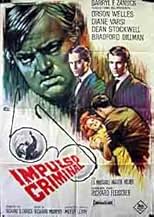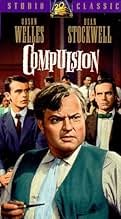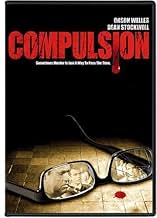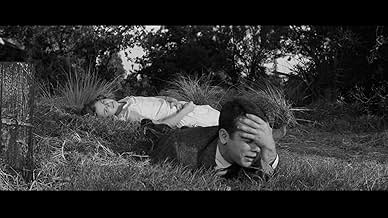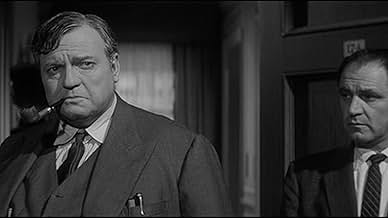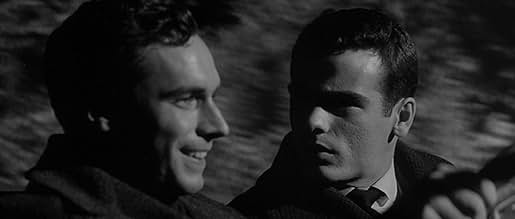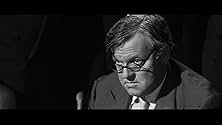IMDb-BEWERTUNG
7,4/10
8127
IHRE BEWERTUNG
In dieser Version des Falls um Leopold und Loeb werden zwei wohlhabende Jurastudenten wegen Mordes vor Gericht gestellt.In dieser Version des Falls um Leopold und Loeb werden zwei wohlhabende Jurastudenten wegen Mordes vor Gericht gestellt.In dieser Version des Falls um Leopold und Loeb werden zwei wohlhabende Jurastudenten wegen Mordes vor Gericht gestellt.
- Regie
- Drehbuch
- Hauptbesetzung
- Nominiert für 1 BAFTA Award
- 1 Gewinn & 5 Nominierungen insgesamt
Robert F. Simon
- Police Lt. Johnson
- (as Robert Simon)
John Alban
- Reporter
- (Nicht genannt)
Don Anderson
- Reporter
- (Nicht genannt)
Brandon Beach
- Courtroom Spectator
- (Nicht genannt)
Terry Becker
- Benson - The Angry Reporter
- (Nicht genannt)
Russ Bender
- Edgar Llewellyn - Attorney
- (Nicht genannt)
Empfohlene Bewertungen
Leopold was paroled after years of being a model prisoner, planning all kinds of prison reforms, and when released did philanthropic work in Puerto Rico. Interesting that Meyer Levin, author of book on which this film is based said, this amazingly redeemed man just a few times gave Levin a chill as it became clear that this character of 'St. Leopold' was just another creation of a true psychopath. The mocking narcissistic smirk was still there under it all.
Seeing "Compulsion" again after a very long time, it amazed me how well I remembered it. In fact I remembered every tiny little turn in Dean Stockwell's eyes. He is superb in the part of the young semi genius with a weakness for the shallow Bradford Dillman. The Leopold and Loeb case was the base for this thrilling Richard Fleischer film. It won acting awards for Stockwell, Dillman and Orson Welles at the Cannes Film Festival but with the benefit of hindsight, Dean Stockwell emerges as the winner against the famous test of time. Dillman seems a little bit too everything. Welles is great fun to watch and E G Marshall is terrific as the man determined to unmask the "powder poofs". Stockwell fainting at the trial, something that could have been so over the top, is in fact, shattering. The Leopold and Loeb story was also the base for Hitchcock's "Rope" and the wonderful Tom Kalin's "Swoon" Another version was rumored in 1991, directed by Martin Donovan with River Phoenix in the Stockwell part.
In that actual murder case, two college students who happen to be geniuses decide that the rules don't apply to the superior intellect, and they murder some random child just for the experience, having planned the details out carefully. But since I am writing about this, apparently it was not careful enough.
All of the details of the murder case are pretty accurate, but there are fictional characters installed because this is more of a character study than a historically accurate account. These two fictional characters are Sid (Martin Milner) a college student and newspaper reporter, and his girlfriend Ruth (Diane Varsi).
Judd Steiner (Dean Stockwell) is a rough equivalent to Leopold. Arthur Straus (Bradford Dillman) is a rough equivalent to Loeb. This is still the 1950s, so the production code wouldn't allow you to just come out and say what is going on between the two of them, but the film does as good a job as it can of portraying Steiner as in love with Straus, although the film has Arthur/Artie as being the one who wants to indulge in all of the criminal behavior with Judd mainly going along so he can keep Artie close to him. In fact it was Leopold/Steiner who was the instigator of all of the crimes that led up to murder. Instead, Steiner is portrayed as a timid guy alienated from his family who would have probably just been a self involved loner with weird hobbies if not for the bad influence of Straus. In fact, I think Ruth is in this film just to insinuate that Steiner "liked" girls more than she is there as a girlfriend for the all American student journalist, Sid.
It's actually a pretty good look at what criminal investigators had to work with 100 years ago before there was DNA - identifying a typewriter from a ransom note, and being able to trace one pair of glasses out of thousands like it down to the person who owned them. As for interviews, before "you have the right to remain silent" was part of the police procedural vernacular, the smart investigator wants to keep the suspect talking - if he is guilty eventually he will trip himself up. Bright lights, billy clubs, and brutality are not required.
Although Orson Wells doesn't appear on screen until halfway through the film, he dominates the conclusion. His character, John Wilk, is based on Clarence Darrow who was probably the most famous defense attorney in the country during the early 1900s. He is faced with the difficult task of preventing two rich kids with every advantage who killed a child for the thrill of it all from going to the gallows.
All of the details of the murder case are pretty accurate, but there are fictional characters installed because this is more of a character study than a historically accurate account. These two fictional characters are Sid (Martin Milner) a college student and newspaper reporter, and his girlfriend Ruth (Diane Varsi).
Judd Steiner (Dean Stockwell) is a rough equivalent to Leopold. Arthur Straus (Bradford Dillman) is a rough equivalent to Loeb. This is still the 1950s, so the production code wouldn't allow you to just come out and say what is going on between the two of them, but the film does as good a job as it can of portraying Steiner as in love with Straus, although the film has Arthur/Artie as being the one who wants to indulge in all of the criminal behavior with Judd mainly going along so he can keep Artie close to him. In fact it was Leopold/Steiner who was the instigator of all of the crimes that led up to murder. Instead, Steiner is portrayed as a timid guy alienated from his family who would have probably just been a self involved loner with weird hobbies if not for the bad influence of Straus. In fact, I think Ruth is in this film just to insinuate that Steiner "liked" girls more than she is there as a girlfriend for the all American student journalist, Sid.
It's actually a pretty good look at what criminal investigators had to work with 100 years ago before there was DNA - identifying a typewriter from a ransom note, and being able to trace one pair of glasses out of thousands like it down to the person who owned them. As for interviews, before "you have the right to remain silent" was part of the police procedural vernacular, the smart investigator wants to keep the suspect talking - if he is guilty eventually he will trip himself up. Bright lights, billy clubs, and brutality are not required.
Although Orson Wells doesn't appear on screen until halfway through the film, he dominates the conclusion. His character, John Wilk, is based on Clarence Darrow who was probably the most famous defense attorney in the country during the early 1900s. He is faced with the difficult task of preventing two rich kids with every advantage who killed a child for the thrill of it all from going to the gallows.
The film deal with two young men (Bradford Dillman , Dean Stockwell) who murder a pal . They are law students and followers to Nietsche theories . They are investigated by an astute prosecutor (E.G.Marshall) . He's growing suspicion but there isn't one perfect crime . As the relentless justice to be executed and they go on trial for killing . A famous lawyer (Orson Welles) will defend them on the accusation of murderers and under death penalty . A young girl (Diane Varsi) will testify for them .
This highly interesting film is inspired on real events about Nathan Leopold-Richard Lob killing case in Chicago of the 1920s . Although the story was obviously a thinly-disguised recreation of the known murder case , the legal department of 20th Century Fox was still concerned about a possible lawsuit from the still-living Leopold . In fact , a great effort was made not to mention Leopold or Loeb in the film , press releases , and interviews . The film contains suspense , drama , tension , illicit love with intertwining triangles , emotion , courtroom trial and complex intrigue maintained throughout . Besides , superb performances by main roles (Dillman , Stockell , Varsi, Welles) and supporting casting (Martin Milner , Robert F. Simon , Gavin McLeod , among others). Special mention for Orson Welles who displays a terrific acting and explaining a significant speech into criminal court . The movie is visually magnificent with an excellent black and white cinematography by William C. Mellor . Evocative and adjusted music by Lionel Newman . The motion picture was wonderfully directed by Richard Fleischer .
This is the second of four film adaptations of the Leopold-Loeb murder case , other versions about same events are the famous ¨The rope¨ (1948) by Hithcock with John Dall (in the character of Bradford Dillman )and Farley Granger (in the role of Dean Stockwell), ¨Swoon¨ and recently ¨Murder by numbers¨ by Barbet Schroeder with Michael Pitt and Ryan Gosling . Indispensable and fundamental seeing for court genre enthusiasts and Orson Welles fans . It's one of Richard Fleisher's best. Rating : Above average .
This highly interesting film is inspired on real events about Nathan Leopold-Richard Lob killing case in Chicago of the 1920s . Although the story was obviously a thinly-disguised recreation of the known murder case , the legal department of 20th Century Fox was still concerned about a possible lawsuit from the still-living Leopold . In fact , a great effort was made not to mention Leopold or Loeb in the film , press releases , and interviews . The film contains suspense , drama , tension , illicit love with intertwining triangles , emotion , courtroom trial and complex intrigue maintained throughout . Besides , superb performances by main roles (Dillman , Stockell , Varsi, Welles) and supporting casting (Martin Milner , Robert F. Simon , Gavin McLeod , among others). Special mention for Orson Welles who displays a terrific acting and explaining a significant speech into criminal court . The movie is visually magnificent with an excellent black and white cinematography by William C. Mellor . Evocative and adjusted music by Lionel Newman . The motion picture was wonderfully directed by Richard Fleischer .
This is the second of four film adaptations of the Leopold-Loeb murder case , other versions about same events are the famous ¨The rope¨ (1948) by Hithcock with John Dall (in the character of Bradford Dillman )and Farley Granger (in the role of Dean Stockwell), ¨Swoon¨ and recently ¨Murder by numbers¨ by Barbet Schroeder with Michael Pitt and Ryan Gosling . Indispensable and fundamental seeing for court genre enthusiasts and Orson Welles fans . It's one of Richard Fleisher's best. Rating : Above average .
"Compulsion" was one of the most important American films of the late 50s. Based loosely on the famous Leopold and Loeb case, the movie still packs quite an impact because of the excellent work by the three principals. As directed by Richard Fleischer, this is a disturbing look at two criminal minds who thought they were above and beyond the law because they had the perfect crime planned. The film was greatly adapted for the screen by Richard Murphy from the Meyer Levin book and stage play.
Even for those clever enough to carry on a murder, there is always a possibility that a minor mistake will give the culprit away. The two young men at the center of the story, Judd Steiner and Artie Straus are homosexual lovers. At the time, being gay in America must have been one of the worst things in a more puritanical and pious society. These two men hide their sexual preference well because of the circles they both move. Coming from upper class families, in a way, made it easier for these men to formulate a plan to satisfy their idle existences.
After committing a heinous crime, just because they thought they could get away with it, the two friends begin experiencing the guilt associated with what they have done. Judd's reaction is different from Artie's. Where Judd tries to lay low, Artie tries to help the police in a bold move that will end up badly. Judd suddenly feels abandoned by Artie when he realizes Artie might be getting too close to the people investigating the murder.
As careful as these men had been, something that apparently seems innocent, ties them to the crime. The principal investigator, Sid Brooks, turns the men against one another by playing his cards right. This is the moment that Jonathan Wilk, the famous trial lawyer enters the picture. Unfortunately, even a star lawyer can't save people that have talked too much because they thought they were above the law.
Star lawyers have always been at the center of all famous trials throughout the history. In a way, it's ironic that only one man, the great Jonathan Wilk is the only person in court to defend Steiner and Straus. Had it been today, these two men would have had a battery of expensive lawyers making the case for them. The figure of Wilke is based on the real lawyer of the Leopold and Loeb case: Clarence Darrow, a man larger than life.
Dean Stockwell and Bradford Dillman made an invaluable contribution to the success of the film. Mr. Stockwell, a child actor that grew up in front of the camera, makes a compelling Judd Steiner. Mr. Stockwell gets under Steiner's skin because he seems to know what made this young man do what he did. Mr. Dillman was a relative new face to the movies, but his performance as Artie Straus has a profound effect on the viewer. Neither man makes a likable person, but maybe that was the message the author of the play wanted to leave the viewer with.
Orson Welles made a splendid appearance as the defense lawyer, Jonathan Wilk. Mr. Welles' physical presence dominates most of the court proceedings. In fact, is a tribute to his genius that he towers over everything around him whenever he is in front of the camera. E. G. Marshall has some good moments as Sid Brooks, the investigator who unearths the truth in this case. Ed Binns, Martin Milner, Robert Simon, Richard Anderson make contributions to the film. Diane Varsi, as the Ruth Evans is the only female that has an opportunity in the film.
The film moves at a quick pace and will, no doubt, satisfy those viewers seeking intelligent entertainment.
Even for those clever enough to carry on a murder, there is always a possibility that a minor mistake will give the culprit away. The two young men at the center of the story, Judd Steiner and Artie Straus are homosexual lovers. At the time, being gay in America must have been one of the worst things in a more puritanical and pious society. These two men hide their sexual preference well because of the circles they both move. Coming from upper class families, in a way, made it easier for these men to formulate a plan to satisfy their idle existences.
After committing a heinous crime, just because they thought they could get away with it, the two friends begin experiencing the guilt associated with what they have done. Judd's reaction is different from Artie's. Where Judd tries to lay low, Artie tries to help the police in a bold move that will end up badly. Judd suddenly feels abandoned by Artie when he realizes Artie might be getting too close to the people investigating the murder.
As careful as these men had been, something that apparently seems innocent, ties them to the crime. The principal investigator, Sid Brooks, turns the men against one another by playing his cards right. This is the moment that Jonathan Wilk, the famous trial lawyer enters the picture. Unfortunately, even a star lawyer can't save people that have talked too much because they thought they were above the law.
Star lawyers have always been at the center of all famous trials throughout the history. In a way, it's ironic that only one man, the great Jonathan Wilk is the only person in court to defend Steiner and Straus. Had it been today, these two men would have had a battery of expensive lawyers making the case for them. The figure of Wilke is based on the real lawyer of the Leopold and Loeb case: Clarence Darrow, a man larger than life.
Dean Stockwell and Bradford Dillman made an invaluable contribution to the success of the film. Mr. Stockwell, a child actor that grew up in front of the camera, makes a compelling Judd Steiner. Mr. Stockwell gets under Steiner's skin because he seems to know what made this young man do what he did. Mr. Dillman was a relative new face to the movies, but his performance as Artie Straus has a profound effect on the viewer. Neither man makes a likable person, but maybe that was the message the author of the play wanted to leave the viewer with.
Orson Welles made a splendid appearance as the defense lawyer, Jonathan Wilk. Mr. Welles' physical presence dominates most of the court proceedings. In fact, is a tribute to his genius that he towers over everything around him whenever he is in front of the camera. E. G. Marshall has some good moments as Sid Brooks, the investigator who unearths the truth in this case. Ed Binns, Martin Milner, Robert Simon, Richard Anderson make contributions to the film. Diane Varsi, as the Ruth Evans is the only female that has an opportunity in the film.
The film moves at a quick pace and will, no doubt, satisfy those viewers seeking intelligent entertainment.
Wusstest du schon
- WissenswertesAlthough the story was a thinly-disguised recreation of the Nathan Leopold and Richard Loeb murder case, the legal department of 20th Century Fox was still concerned about a possible lawsuit from the still-living Leopold. A great effort was made not to mention Leopold or Loeb in the movie, press releases, and interviews. However, there was apparently poor communication with the advertising department, since when the movie came out, newspaper ads stated, "based on the famous Leopold and Loeb murder case." Leopold sued the filmmakers. He did not claim libel, slander, nor anything false nor defamatory about the film. Instead, he claimed an invasion of privacy. The court rejected his claim, in part, because Leopold had already published his own autobiography "Life Plus 99 Years," presenting essentially the same facts.
- PatzerWhen the murdered boy is in the morgue, his uncle recognizes him instantly, and the coroner doesn't mention to the young journalist (who found the glasses) that the kid had acid burned all over his face so he couldn't be identified. In the real life case, his face was burned and, most importantly, at the very end of the movie, Orson Welles as the defending attorney mentions that the murdered boy's face was burned with acid.
- Zitate
Jonathan Wilk: If there is any way of destroying hatred and all that goes with it, it's not through evil and hatred and cruelty, but through charity, love, understanding.
- Crazy CreditsOpening credits prologue: CHICAGO, 1924
- VerbindungenFeatured in The Paper Chase: Commitments (1983)
Top-Auswahl
Melde dich zum Bewerten an und greife auf die Watchlist für personalisierte Empfehlungen zu.
Details
- Erscheinungsdatum
- Herkunftsland
- Sprache
- Auch bekannt als
- Compulsión
- Drehorte
- Produktionsfirma
- Weitere beteiligte Unternehmen bei IMDbPro anzeigen
- Laufzeit1 Stunde 43 Minuten
- Farbe
- Seitenverhältnis
- 2.35 : 1
Zu dieser Seite beitragen
Bearbeitung vorschlagen oder fehlenden Inhalt hinzufügen

Oberste Lücke
By what name was Der Zwang zum Bösen (1959) officially released in India in English?
Antwort

